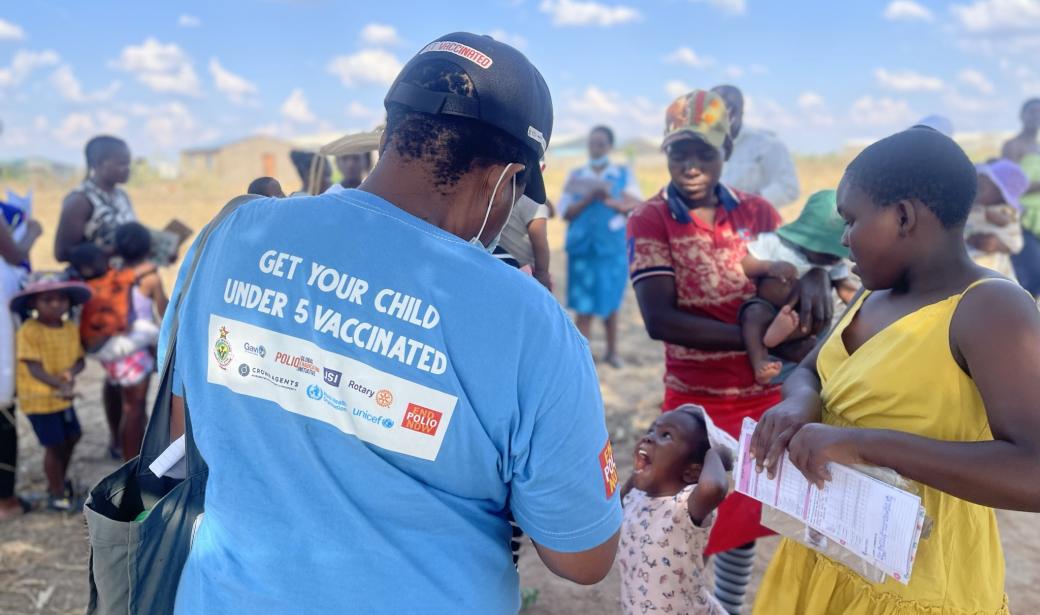Source: WHO Zimbabwe Press Release – Zimbabwe | ReliefWeb Harare, Zimbabwe – Vaccines remain one of the most cost-effective and successful public health interventions, saving millions of lives while preventing disabilities and suffering for many. From 24-30 April 2023, the United Nations Children’s Fund (UNICEF) and the World Health Organization (WHO) in Zimbabwe join the […]
Source: WHO Zimbabwe Press Release – Zimbabwe | ReliefWeb

Harare, Zimbabwe – Vaccines remain one of the most cost-effective and successful public health interventions, saving millions of lives while preventing disabilities and suffering for many. From 24-30 April 2023, the United Nations Children’s Fund (UNICEF) and the World Health Organization (WHO) in Zimbabwe join the rest of the continent to mark the African Vaccination Week (AVW), commemorated every last week of April.
The week is an opportunity to raise awareness of the importance of vaccines and promote vaccination across the life course, reducing mortality due to vaccine-preventable diseases. The theme for this year, “The Big Catch Up”, highlight the need to intensify efforts to reach all children with vaccination and Vitamin A supplementation services. This can be done through routine immunization programmes and catch-up vaccination campaigns targeting the hard-to-reach communities.
While a significant number of children are vaccinated every year in Africa, far too many are being left behind. An estimated 33 million children will need to be vaccinated between 2023 and 2025, to put the African region back on track to achieve the 2030 global immunization goals.
In Zimbabwe, the vaccination coverage rate is currently at 90% and well in line with the WHO recommended target. However, several districts nationwide are still performing below target, posing a risk of outbreaks. Regrettably, those unvaccinated, mainly children, are prone to preventable, life-threatening diseases like measles.
“UNICEF congratulates the Government of Zimbabwe, on the continuation of the integrated immunization campaigns, offering several antigens and more opportunities for children to be vaccinated. The Africa Vaccination Week is an important reminder to the key messages that (1) Vaccines save lives and (2) Primary Health Care is a cost-effective approach to reach every child,” said Dr Tajudeen Oyewale, UNICEF Representative to Zimbabwe.
To scale up and bring the country back on track to achieve global goals, heightened political commitment and multi-stakeholder collaboration to reach to underserved communities is urgent. The recent measles and polio outbreaks in neighboring countries have highlighted the urgency to intensify vaccination efforts for both COVID-19 and routine immunization. Furthermore, the ongoing cholera outbreak presents Zimbabwe with an opportunity to improve coverage for the oral cholera vaccine, as well as enhance the provision of safe water and sanitation.
Increased investments in primary health care will bring services closer to communities, making it easier to reach the marginalized. Investing in human resources for health, surveillance and improvements in health information systems is also critical. Multi-stakeholder collaborations to deal with misinformation, build and sustaining community demand while addressing gender barriers will increase coverage, prevent diseases, and save lives.
UNICEF and WHO applaud efforts by the Government of Zimbabwe in promoting access to vaccination at various levels of care and continue to encourage scaling up routine immunization services to significantly reduce the chances of outbreaks.
UNICEF and WHO continue to support the Government of Zimbabwe to raise awareness of the importance of vaccines and immunization together with Vitamin A supplementation to protect eye health and boost immune response, providing technical and financial support to deliver high-quality immunization programmes.
We also call on other stakeholders, including the donor community to continue supporting the Government of Zimbabwe to make vaccination a priority. Now more than ever is the time to make sure all Zimbabweans, particularly children, receive the full benefits of vaccination.
“The progress made so far is really commendable, and we need to build on that by removing barriers particularly for the vulnerable communities to make them more accessible,” said WHO Zimbabwe Representative Professor Jean-Marie Dangou.
We recognize the technical and financial support from other partners, including the Gates Foundation, GAVI THE Vaccine Alliance, Crown Agents, John Snow Research and Training Institute (JSI), and the United Nations Central Emergency Response Fund (CERF) and many others in promoting improved access to vaccines for all in Zimbabwe.







